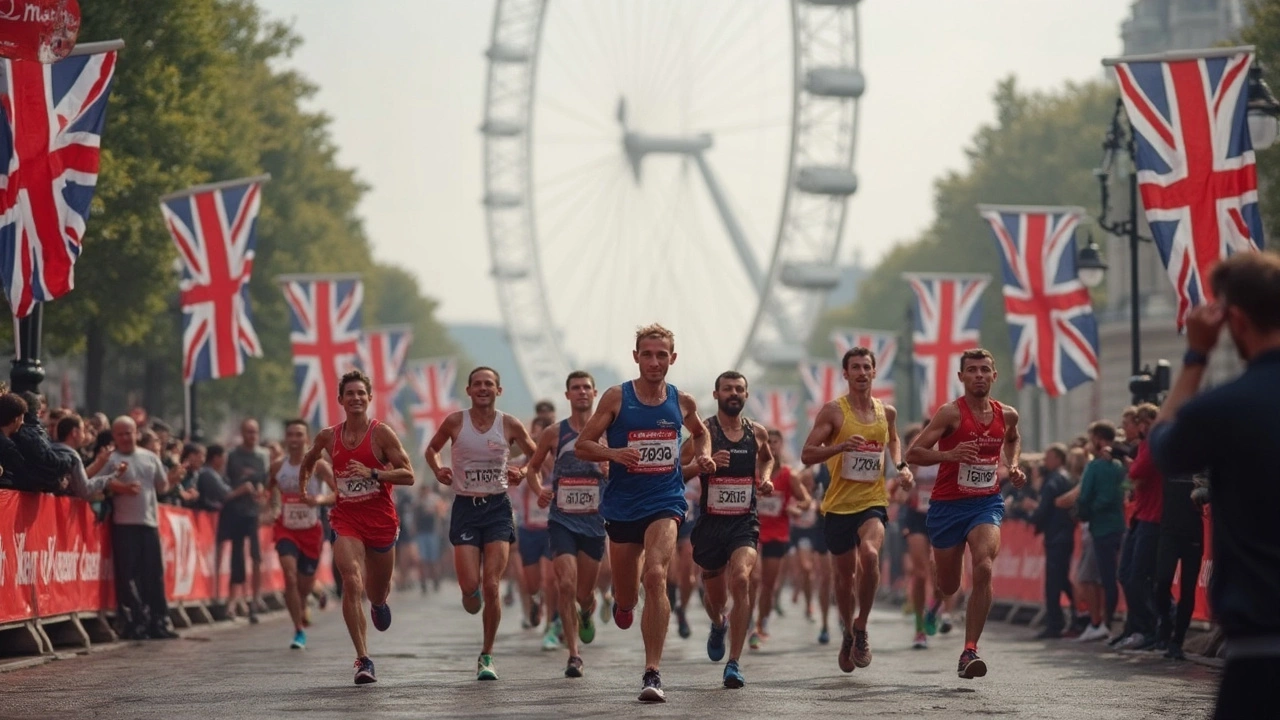How Much Weight Do You Lose After a Marathon? Real Numbers and Why They Matter

Finish a marathon, and the first thing most runners notice is the wild change on the bathroom scale. Drop a kilo or two in one day? Sounds good, right? But here’s the kicker—it’s not all what you might think. Sure, you burn a ton of calories, but weight loss right after 42.2 kilometers is mostly about sweat and lost fluids, not body fat melting away.
Your body is working overtime during the race: pounding pavement, pumping blood faster, sweating buckets. And with that sweat, you’re saying goodbye to water and sodium more than anything else. That’s a big reason why runners often step on the scale post-marathon and see numbers much lower than usual. Don’t rush to celebrate. Most of this ‘weight loss’ comes back as soon as you rehydrate and have a solid meal.
If you’re hoping to shed real body fat from a single marathon, the reality is less dramatic. Fat loss is a slow process and a single race won’t magically melt pounds overnight. The real benefit from marathon running is more about building habits, consistency, and keeping your engine revving over time—not banking on one race-day miracle.
- What Actually Happens to Your Body During a Marathon
- Why Most Weight Loss After a Race is Temporary
- Sweat, Fluids, and the Scale: How Much Do You Actually Lose?
- Calorie Burn: Is Race Day a Shortcut to Fat Loss?
- Tips for Avoiding Dehydration and the Dreaded ‘Clydesdale Plod’
- How to Recover Safely and Manage Your Weight Post-Marathon
What Actually Happens to Your Body During a Marathon
Your body is tested on all fronts when you run a marathon. From the first few hundred meters right through to the finish line, your heart, muscles, lungs, and even your gut are working way harder than they do on a normal day.
Let’s break it down simply. Your heart rate goes up and stays high for hours, pushing blood to keep your muscles fed. As those muscles work like crazy, they use up stored glycogen—that’s the quick-burn fuel saved up from all those pasta dinners the night before. By the last 10 kilometers, most runners are scraping the bottom of the glycogen barrel, which leads to that famous "wall" everyone talks about.
The bulk of marathon weight loss is due to sweating. Depending on the weather and your own sweat rate, you could lose between 1 and 4 liters of fluid during the race. That's why it’s common to finish a marathon looking and feeling a bit deflated.
| Weather | Fluid Lost (Liters) |
|---|---|
| Cool (10–15°C) | 1–2 |
| Warm (16–24°C) | 2–4 |
As you sweat, you’re not just losing water. Salt and other electrolytes are pouring out of your pores as well—which is why cramping and feeling wiped out can hit hard, especially later in the race when your stores run low. That’s also a main reason runners talk about race hydration so much—staying topped up with fluids and electrolytes really matters.
Your joints are also under pressure, absorbing shock with every step. After 30-40 thousand steps, your legs aren’t just tired—they’re a bit swollen, inflamed, and often a little battered. And the gut? Well, if you heard runners sharing war stories about mid-race stomach issues, that’s not just bad luck. With less blood available for digestion (since most is shunted to muscles), your digestive system slows right down and can get grumpy fast.
So, during those hours pounding the streets, you’re using up fuel stores, losing a heap of water and salt, managing your energy, and putting almost every body part on notice. It’s why your body feels so wrecked at the finish—but it’s also why marathon running can be such a rush when you get it right.
Why Most Weight Loss After a Race is Temporary
Step on the scale after pounding out a marathon and—boom—you might see you’ve dropped one or even two kilograms. That sounds impressive until you realise most of this quick loss is water, not lasting marathon weight loss.
Your body tries to cool itself down during the race by sweating, and the amount can be shocking. It’s common to lose between 1 to 3 litres of fluid over 42.2 kilometres, depending on the weather and your sweat rate. But as soon as you start drinking water or sports drinks again, your body soaks it right up, and your weight jumps back to normal within a day or two.
| Factor | Weight Lost (Average) |
|---|---|
| Sweat & water loss | 1 to 3 kg |
| Carbohydrate use (glycogen + water) | 0.5 to 1 kg |
| Fat loss from running | 0.1 to 0.3 kg |
Another reason the scale dips is because your muscles use up their stored carbs (glycogen) during the event. Here’s the catch: each gram of glycogen is stored with about three grams of water. So when your body burns through its fuel, it also releases that water—more temporary weight gone.
Want to know the only weight you actually "lose and keep off" in a day? It's mostly the small bit of fat you burn, and during even a tough race hydration effort, that’s nowhere near the amount of fluid and carb weight that cycles right back in the next 24 hours.
If you want real, lasting changes from marathon running, focus on what you eat, your training habits, and steady fat loss, not the number right after you cross the finish line. That’s where true running calories payoff happens.
Sweat, Fluids, and the Scale: How Much Do You Actually Lose?
The big headline after any marathon: runners often lose anywhere from 1 to 4 kilograms on race day. But almost all of that is water weight, not fat. The marathon weight loss you see on the scale isn’t permanent.
The average person sweats out about 0.8 to 1.5 liters per hour during a marathon, and hot or humid weather in places like Adelaide can make you lose even more. For a typical 4-hour marathon, that adds up to 3 to 6 liters of sweat. That’s enough to explain most weight changes right there.
To see this in numbers, here’s what it can look like:
| Finish Time | Estimated Sweat Loss | Scale Drop (kg) |
|---|---|---|
| 3 hours | 2.4 - 4.5 L | 2.4 - 4.5 |
| 4 hours | 3.2 - 6 L | 3.2 - 6 |
| 5 hours | 4 - 7.5 L | 4 - 7.5 |
So if you hop on the scale after a marathon, you may see some surprisingly low numbers. But as soon as you drink and eat, most of that weight comes right back. This is why focusing only on race hydration and water loss can be a trap—you don’t want to risk dehydration just to see a lower number on the scale. Dehydration comes with headaches, sluggishness, and in serious cases, dizziness or fainting. Not worth it just for a fake win on the bathroom scale.
If you want a more useful number, step on the scale a day or two later, after you’ve rehydrated and resumed eating normally. That’ll show you what, if anything, actually changed from a full 42.2 kilometers. For most runners, real fat loss happens with consistent training, not just from one big sweaty day. Prioritize your health, and let the scale sort itself out over the long haul.

Calorie Burn: Is Race Day a Shortcut to Fat Loss?
The idea that running a marathon is an instant fix for fat loss floats around a lot, but what’s the real story? No doubt, knocking out 42.2 kilometers means you’re torching some serious calories. Most runners burn between 2,500 and 3,500 calories during the race, depending on things like body weight, running speed, and weather conditions. For a heavier runner or someone clocking slower times, that number can go even higher.
Marathon weight loss is mostly about burning extra energy. But before you start picturing your future six-pack, remember: a single marathon probably won’t burn enough fat to show up immediately on your body. Why? Because the body’s first move is to use up stored carbohydrates (glycogen) and water, not to empty your fat reserves. That's why most of the weight lost during the race is just temporary water weight.
It takes roughly a 7,700 calorie deficit to shed one kilogram of pure body fat. So, even with a massive calorie burn, you're not dropping a kilo of fat in a single run. Most runners also load up on carbs before race day and go big on meals after the event—so the net fat loss is often less than expected.
| Runner Weight (kg) | Calories Burned (approx.) |
|---|---|
| 60 | 2,600 |
| 75 | 3,200 |
| 90 | 4,000 |
The real value of marathon training for fat loss comes from the months of regular running, not the race itself. When you build a routine, bump up your weekly mileage, and focus on eating smart, that’s where you start to notice long-term changes in your body composition.
If you actually want to lose weight, the best tip is to look at the whole picture. Combine regular training with healthy eating habits, and use race day as a motivational milestone—not a miracle shortcut.
Tips for Avoiding Dehydration and the Dreaded ‘Clydesdale Plod’
You’ve probably heard horror stories of marathoners shuffling through the last few kilometers, legs feeling like concrete, brain foggy, energy totally gone. That’s what runners call the ‘Clydesdale Plod’—and dehydration is usually a big reason behind it. During a marathon, you can easily lose between 1 to 2.5 liters of sweat per hour, depending on your pace and the weather. Lose too much fluids and your body struggles to cool itself, your pace crashes, and simple maths turns tricky.
The key to sidestepping the plod? Make hydration part of your plan before you even get to the start line. Here are some straight-up tips to keep you on your game and help you avoid nasty race hydration pitfalls:
- Start hydrated: Don’t wait until you’re thirsty on race day. The day before, watch your urine color—a pale yellow is what you want. Slam a glass of water with breakfast and keep sipping through the morning before the gun goes off.
- Drink at regular intervals: Most people need around 400-800ml per hour during a marathon depending on body size, weather, and sweat rate. It’s better to drink small amounts often rather than chug a huge amount in one go.
- Don’t skip electrolytes: Sweat isn’t just water—it’s packed with sodium and other minerals. Most marathons offer sports drinks at aid stations. If you’re a salty sweater or it’s a hot day in Adelaide, bring your own electrolyte chews or tabs.
- Practice your strategy: If you’re new, try different drinks and amounts on long training runs. Everyone’s guts react differently, and race day isn’t the time for surprises.
- Don’t go overboard: Too much water can be bad too, leading to a dangerous condition called hyponatremia. Listen to your body, don’t force huge amounts if you’re not thirsty and your stomach feels sloshy.
Here’s a handy table with typical sweat and fluid needs, based on current sports research:
| Condition | Typical Sweat Loss (L/hr) | Suggested Fluid Intake (ml/hr) |
|---|---|---|
| Cool Temp (12-16°C) | 0.7 | 400-600 |
| Warm Temp (17-22°C) | 1.0 | 600-800 |
| Hot Day (23°C+) | 1.5+ | 750-1000 |
Treat these numbers as a guide and adjust based on your own experience. The best runners nail their marathon weight loss by keeping fluid changes in check and energy levels steady from start to finish.
How to Recover Safely and Manage Your Weight Post-Marathon
Crossing that marathon finish line feels epic, but what you do in the next few days matters more for your body—and for keeping weight in check. Right after a tough race, your muscles are sore, your immune system is a bit battered, and your marathon weight loss is mostly water. So, the first rule: don’t panic or overreact to weight gain as you rehydrate.
One fact to keep in mind: most runners regain about 1–3 kg in the days after a marathon as the body refuels its glycogen stores and rehydrates. This is normal and expected. If the scale jumps back up after a couple of meals and a few bottles of water, you’re not suddenly undoing all your training.
- Refuel wisely: Focus on balanced meals with carbs to restore muscle glycogen, plenty of protein for muscle repair, and enough healthy fats. Try not to binge on junk food just because you “earned it”—that’s an easy way to turn temporary marathon weight loss into long-term weight gain.
- Hydrate smart: You lose liters of fluid in a race. Sip water regularly post-race, but don’t go overboard—drink to thirst, and consider some electrolyte drinks if you ran in hot weather.
- Listen to your hunger: Your appetite might be all over the shop. It’s common to want everything in sight, but eat slow and see how your stomach feels.
- Get moving (gently): Light walks or easy cycling help boost blood flow and reduce soreness, but skip hard workouts for a week or more.
If you’re really chasing fat loss, focus on consistency over weeks and months, not one race. Keep up regular running, monitor your eating, and check the scale weekly—not daily right after the race.
| What | How Much is Typical | Tips |
|---|---|---|
| Fluid loss (in sweat) | 1.5–4 liters | Rehydrate slowly, prioritise electrolytes if you sweat heavily |
| Calories burnt | 2,500–3,500 kcal | Don’t rush to "replace" calories—spread refueling over 24–48 hours |
| Weight regain (water, glycogen) | 1–3 kg in 2 days | Completely normal—ignore the scale for a week |
Last thing: don’t try to “diet” hard right after a marathon. Your body’s still healing. Give it good food, hydration, sleep, and gentle movement, and you’ll stay on track with healthy post-race recovery and long-term weight goals.




